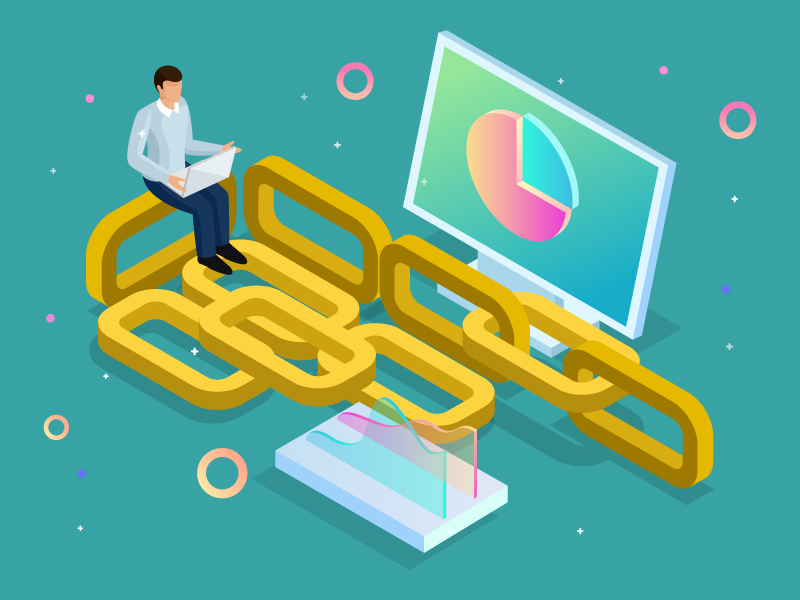Since the pandemic, consumer behaviors have changed. Now, more than ever, they (consumers) depend (98%) on the internet to research businesses — out of curiosity or before making a purchase.
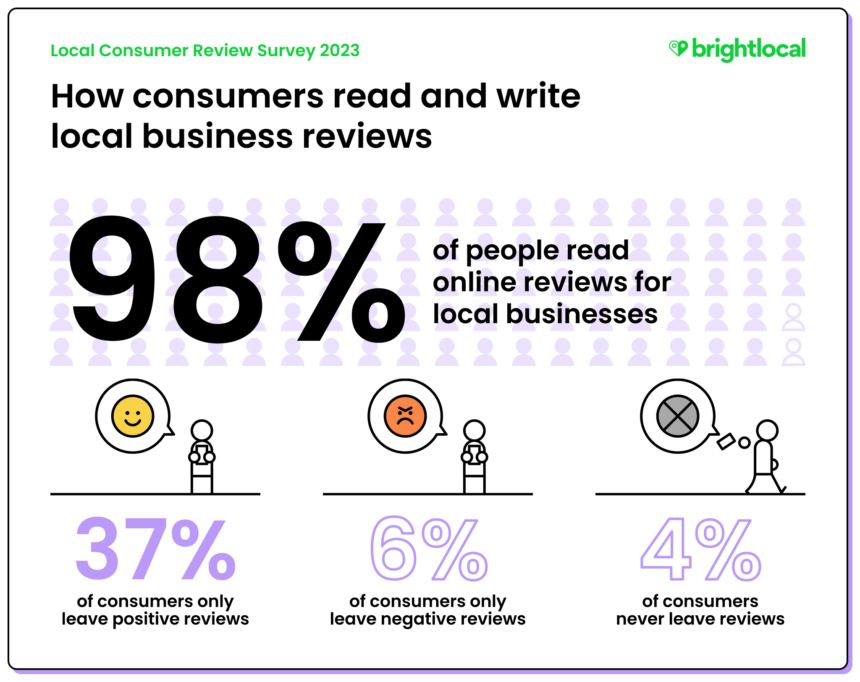
So, SEO (Search Engine Optimization) is crucial for all — small businesses and corporations.
But there is yet another piece of information that you’d find interesting:
According to Google’s Consumer Journey, local-based search has increased.
For specifics, “available near me,” “now near me,” and “along my route” searches increased by 100%, 200%, and 1000%, respectively.
And so?
Optimizing your business for search engines is brilliant. But doing it for local search (local SEO) is more profitable.
Take a clue from Google. Why do you think Google started GBP (Google Business Profile)?
Why do you think GBP ranks higher in search results than blog posts and landing pages?
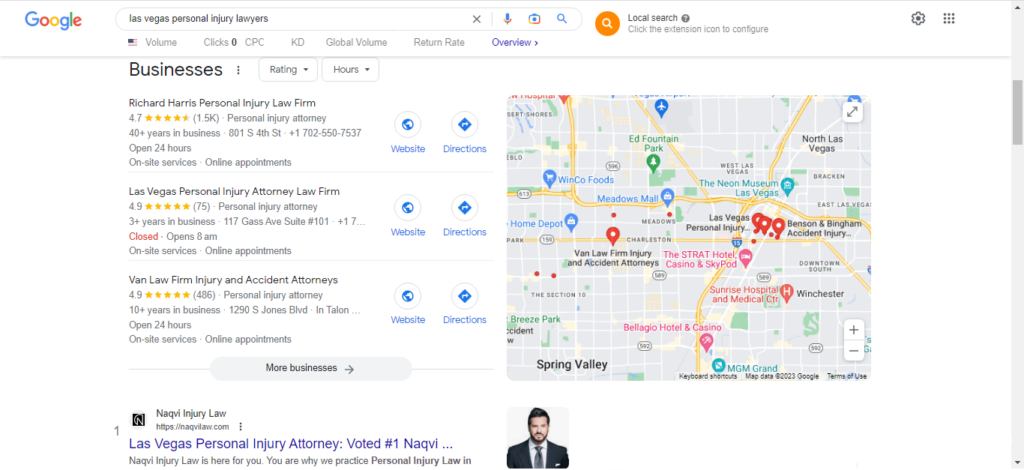
It’s simple. Google is cashing out on the prevalence of local-based searches. You should follow suit.
Bottom line:
You should not only care about local link building. Prioritize it — build the right and quality local links to your business.
This article will explain the latter part (the building part) in detail. Let’s delve in already!
What Is Local Link Building?
Local link building is a crucial component of any successful digital marketing strategy, especially for businesses aiming to boost their online visibility within specific geographic regions.
Simply put, it involves the process of acquiring backlinks from other local businesses’ websites that are located in the same local area as your business.
These links act as virtual endorsements, signaling to search engines that your website is a reputable and authoritative source for information related to your industry or niche within that specific locality.
The primary goal of local link building is to improve your website’s search engine rankings for location-specific keywords.
For instance, if you run a bakery in New York City, obtaining high-quality links from other local businesses, such as coffee shops or event venues, can help your website appear higher in search results when someone searches for “best bakeries in NYC.”
This not only drives targeted traffic from your target audience to your site but also enhances your credibility within your local community.
However, it’s important to note that local link building isn’t just about quantity; domain authority, relevance, and authority of the linking websites play a significant role in determining the impact of these links on your local SEO link building efforts.
In essence, local link building is a strategic approach that combines networking, outreach to local business owners, and content creation, including local content, to establish a strong online presence within your local market.
By securing high-quality links from local sources, you can boost your website’s authority, improve its search engine rankings, and ultimately attract more customers from your target geographic area.
In addition to traditional link building, optimizing your business listing in local directories and business listings can also be a powerful tool in your local digital marketing arsenal. In the ever-competitive digital landscape, mastering local link building and leveraging business listings can give your business the edge it needs to stand out and thrive in your local market.
Why Link Building for Local SEO Matters
While optimizing your website for local search queries is essential, it’s equally important to recognize the significance of link building in this context.
Link building, the process of acquiring high-quality backlinks from other reputable websites, plays a pivotal role in boosting your local SEO strategy.
These links act as trust signals to search engines, indicating the credibility and relevance of your business to local customers, thus influencing your local rankings in the SERPs (Search Engine Results Pages).
When it comes to local SEO, quality often trumps quantity.
Securing local backlinks from authoritative local sources, such as local news outlets, community organizations, or local bloggers, can significantly enhance your website’s visibility in local search results.
These links not only improve your search engine ranking factors but also increase your brand’s credibility and trustworthiness in the eyes of potential customers.
In the rest of the blog post, we’ll delve into the reasons why link building is an indispensable component of any successful local SEO strategy and provide actionable tips on how to build a robust backlink profile that will help your business stand out in the local search results and navigate the algorithmic intricacies of modern search engines.
Stay tuned to discover the power of link building for local SEO and how it can propel your business to the forefront of your local market.
10 Legit Ways To Build Quality Local Links
Add Your Business To Authoritative Directories
While the focus is on “authoritative directories,” you must also feature where other businesses in your area are: the “local directories.”
So, below is your first assignment.
- Type “[your city] business directory” on Google
- Follow through with the suggestions
- The chances are that you won’t find a straightforward way to add a listing. In that case, contact the owner of the directory.
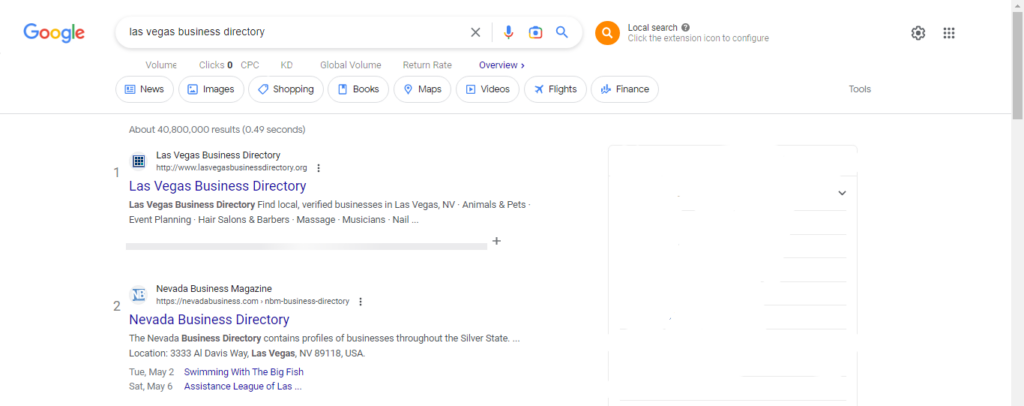
Pro tip:
Never pay to get listed on any directory unless it’s a high-traffic and valuable listing. Also, remember that directory links are not worth much.
So, value all that before paying for any listing.
After the local directories, aim for the big shots. Examples of the latter are:
- Data Axle
- Localeze
- Foursquare
- Google My Business
- Bing
- Apple Maps
- Yelp
- Yellowpages
- Dunn & Bradstreet
- TomTom
Another form of citation you can explore is “local tourist board.” What if your business is not tourism-related?
Local blogs and tourism boards have listings for local organizations and businesses too.
Do Barnacle SEO
Coined by Will Scott of Search Influence, barnacle SEO means attaching your business to a high-traffic site to benefit from the latter’s link juice.
FYI, barnacle SEO is another form of local citation. The only difference is that you’re getting listed on directories already ranking for your money keywords.
So, how do you get the so-called high-traffic sites?
- Type your money keywords on Google’s search bar
- Check the results
- Don’t bother to target competitors. They’d hardly feature you on their sites.

Often, you’ll find aggregator directories (like in the picture). Add your business to the listing too.
Focus On Locally-relevant Content
As far as local SEO is concerned, locally-relevant content performs better. And that makes sense.
Look at this example.
Let’s say you’re the prospect looking for a restaurant in Las Vegas. Which of the topics below will interest you:
- How to choose the best restaurants, or
- How to choose the best restaurants in Las Vegas [+ the top 5]
Chances are, you’d lean towards option 2. Wondering why?
Option 2 precisely aligns with your search intentions. Additionally, it furnishes you with a curated list of establishments to explore.
This same principle holds true for your target audience as well. Nobody wants to invest their time in generic or boring piece of content when a location-specific alternative is available.
Nevertheless, we shouldn’t disregard generic yet valuable content ideas entirely.
They can serve as opportunities for guest blogging and generally attract the highest volume of traffic for search rankings
Nonetheless, for the sake of bolstering your local SEO, it’s imperative to diversify your content. When it comes to your GBP (or GMB) posts, ensure they are locally pertinent.
Here are a few ideas you can start with:
- Linkable assets
- An interactive map of the local attractions in your business city
- A statistics page about local events and businesses
- An ultimate guide about the local people, food, and tourism opportunities
Moving away from the fundamentals, let’s discuss getting link juice from external sources.
Guest Posting
Now, you’ve mastered writing on your site. Extend your mastery to other websites. However, be specific and intentional about where to write.
For starters, don’t guest post on sites where you will only be mentioned but without a backlink. It doesn’t work for your local SEO aims.
More importantly, don’t waste on generic blogs with zero relevance to your business and area of expertise. You’ll hardly convert their audience.
So, what should you do?
- Target local presses in your area that publish original stories and link back to the contributor.
- Spice up your guest posts. Don’t make them just how-tos. Discuss newsworthy and historical events.
Be The Source To Local Reporters
Contrary to any misconceptions you may have encountered, local websites and local newspapers play significant roles in enhancing your organic search engine optimization (SEO) efforts.
Specifically, local media outlets boast a dedicated local audience, cultivated over decades and generations, which presents a valuable resource for your business.
This devoted local audience can prove highly beneficial for your enterprise. Therefore, it’s essential to harness its potential.
How can you achieve this?
Chances are, you’re already familiar with the prominent publications in your local area.
Take the initiative to connect with them by offering unique and original stories.
By doing so, you can secure valuable features for your business in local newspapers, thereby bolstering your presence in organic search results.
Pro tip:
Niche down the media to feature to fast-track your chances of a feature. Use Google to round up all the local media in your city. Then, pick the ones most related to your business.
Aside from direct contact with local media, you can use services such as HARO. Create an account as a “source” and supply reporters with newsworthy stories.
Read more: How To Build HARO Links
Go After Your Competitors’ Backlinks
The chances are that you already know who your competitors are. If you don’t, a simple Google search will reveal them. Or you could use Ahrefs Site Explorer to check competing domains.
By now, you should have a list of the competitors in your local area. Afterward, follow the below instructions:
- Go to Ahrefs Link Intersect
- Type in your site and competitors
- The tool will show you websites that link to your competitors’ sites but not yours
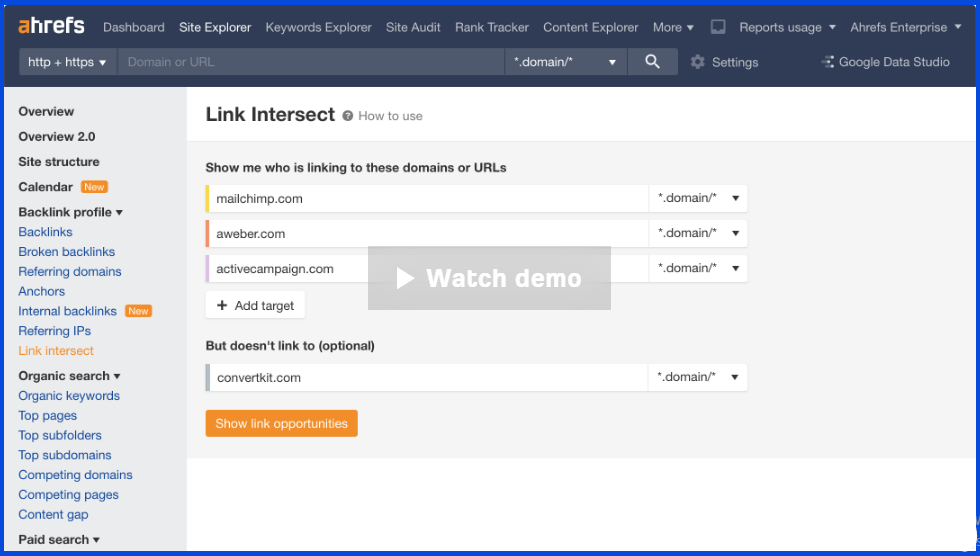
- Now, target the said sites
Mere targeting of your competitors’ backlink sources won’t yield results. Offer them value first.
For example, check if any of the said site links are broken. Point the owners’ attention to the broken links and offer a replacement page.
Further reading: How To Do Competitors Backlink Analysis
Influencer Marketing
Unless your competitors are actively building links, you’ll soon run out of sources to go after. Unfortunately, that’s often the case with local SEO — businesses have capped budgets for link building.
What’s the way out?
Think partnering!
Find local actors in your area — they could be podcasters, bloggers, bloggers, or social media influencers.
For better results, find influencers with overlapping interests. Pitch a unique idea to them and get FREE links and exposure.
The BEST part: influencers actively seek experts on their podcasts and interviews. They want to leverage the opportunity to grow their audience. So, it’s a win-win!
What if the influencer turns you down?
The chances of being rejected are slim. However, the top influencers might request payment.
Pro tip:
If you must pay, do so for influencers with huge following and engagement. For that, your ROI will be significant.
Don’t Lose Old Links
As you did with competitors’ backlinks, look at your site. Find your broken links.
What if you don’t have broken links?
If you had redesigned your website several times, you might have lost some links to the previous design.
Either way, check and confirm.
Here’s how to go about that:
- Go to Ahrefs Site Explorer
- Enter your URL
- Look to the left tab and select “best by links.”
- Lastly, filter the search by “404 not found.”
Employ Guerrilla Marketing Tactics
So far, you have employed conventional link building tactics. It is time to try unconventional methods — guerilla tactics.
Now, note that guerrilla marketing tactics can be expensive. But you won’t target such.
Start small with ideas like the below:
- Creating graffiti on POPULAR, high-traffic roads in your local area
- Engaging small mobs in the busiest junction in your city
- Sponsoring a local event — best if the event is somewhat related to your niche
- Holding contests in forums
You might be wondering: how will you convert the events into backlinks?
- Send the report of the events as a press release to local PRs.
- Media outlets will pick up the news if it goes viral and link back to your site.
Target Unlinked Brand Mentions
At this point, your brand should have garnered significant recognition, becoming a sought-after entity for other businesses to partner with.
Essentially, you will effortlessly secure sponsorships and valuable links.
Simultaneously, there may be instances where certain businesses or blogs merely mention your brand without providing a link back to your business website.
It’s advisable to reach out to these individuals or organizations to explore potential sponsorship opportunities and optimize your algorithmic visibility.
How?
- Go to Google Alerts
- Set up an alert for your business
- Then, monitor if your mentions are linked
- If the mentions are unlinked, reach out to the “author.” Thank them for the post, and subtly request a backlink.
Additional Tips On Perfecting Your Local Link Building Strategies
Fix Your NAPs
Gathering citations is AWESOME. But are the listings accurate and consistent?
If not, you would be wasting your local link building efforts.
Go over your citations again. Ensure your name, address, and phone number are accurate and consistent.
Don’t Focus On Metrics Like DA
You’ll hardly see websites with a high DA (70+) in local SEO. So, don’t focus on such metrics.
Instead, prioritize the site’s position in search results and organic traffic.
Build A Top-notch Inter Linking
Without a top-notch internal link system, your link juice won’t flow to the RIGHT pages (your money pages).
So, re-check your processes. Ensure your backlinks point to the pages on your site that matter.
Local Link Building Needs Help
Reaching the zenith with only local link building is not sustainable. Sustain the efforts with other SEO strategies.
Learn the said strategies on our blog!
